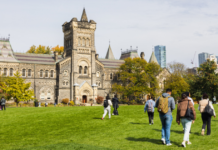While you may have fond memories of running around carelessly in your grassy elementary school field, playing “capture the flag” or “red rover,” your children and grandchildren may not be granted the same experience due to Canada’s high population growth, fueled by immigration.
At a March 2023 school board meeting in Surrey, BC, trustee Gary Tymoschuk stated that the days of building rancher-style schools are “gone.” He mused that schools will have to be built multiple storeys high – “who knows how high the school will be.”
“We need to look at one of the existing elementarys and it becomes a secondary for that area and we put the elementary in a tower,” said Tymoschuk.
Other ideas the Surrey school district had included putting classrooms in “commercial properties” and other “urban” spaces, as a new Skytrain line being built in the city will densify many local neighbourhoods.
Assistant Superintendent Christy Northway said that while they “recognize, value the importance of outdoor play space,” they will be “beginning to look at that a little bit differently.”
In this urban school model, where children attend classes in towers, they would access kitchens, science labs, art studios, and libraries through city-run community facilities or via partnerships with private businesses. It is not decided yet whether community facilities would remain open to the public while schoolchildren would be using them, or whether they would close to the public during the school day.
Crosstown Elementary School in Vancouver was presented as an example of an urban multi-storey school. The Crosstown Elementary playground is known to be plagued with discarded syringes and drug paraphernalia from local addicts, and now has a designated parks staff patrol.
Surrey, BC is the third-fastest growing municipality in Canada and the largest school district in the province. Approximately 1 in 10 Surrey students attends their classes in a portable.
According to the 2021 census, 45% of Surrey residents are immigrants.
Canada’s population grew by 1.05 million people in 2022, almost entirely due to the arrival of immigrants, refugees, international students, and temporary foreign workers.





















